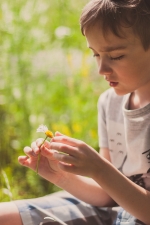Sue Gerhardt reminded us of these sad instructions in her wonderful book: Why Love Matters: How Affection Shapes a Baby's Brain. You can see from what we know these days, that the pendulum of parenting fashion has swung very wide and very much for the better.
However, for many people and regardless of the zeitgeist, growing up with the people who raised them was dangerous. I have been writing about attachment theory recently and today I am tackling the difficult subject of what is known as ‘disorganised attachment’. The folk who have to live with this attachment style, as children had to try and manage to turn for safety to those who were also the source of the danger that made them unsafe. They are the children of abusers.
Try, if you will, to imagine what it would be like to be raised with this terrible dilemma. Imagine the mental gymnastics that must take place for the child to make some sense of this. Imagine how much you would be unable to think about because it is too painful and also because the mind comes up short, caught in a snare of conflicting ideas. Unbearable. I am sorry that some who read this will have no difficulty understanding what this was like because it was their experience. Many still grapple with its effects.
Lewis, Amini and Lannon, in their book: A General Theory of Love, wrote:
“Children think they are to blame for all sorts of things, sometimes consciously, often deeply unconsciously. And big feelings are too hard for them. If there is no one to help them with such feelings e.g. overwhelming sadness, grief, fear, the inability to manage, or integrate, such states can impact on the child’s developing self in such a way that the effects are lifelong.”
The very serious impacts of such an upbringing can be attended to and resolved through work with a psychotherapist or psychoanalyst. You should expect such work to take a long time and to be difficult. But it is vital to make a start if you can. David Wallin says: “It is never too late to move toward making sense of your experiences & healing your past. Not only you but also your child will benefit.”
Intergenerational trauma ceases to be handed down as a powerful, unconscious and dangerous legacy when someone recognises it and takes the courageous step of refusing to be its instrument.





